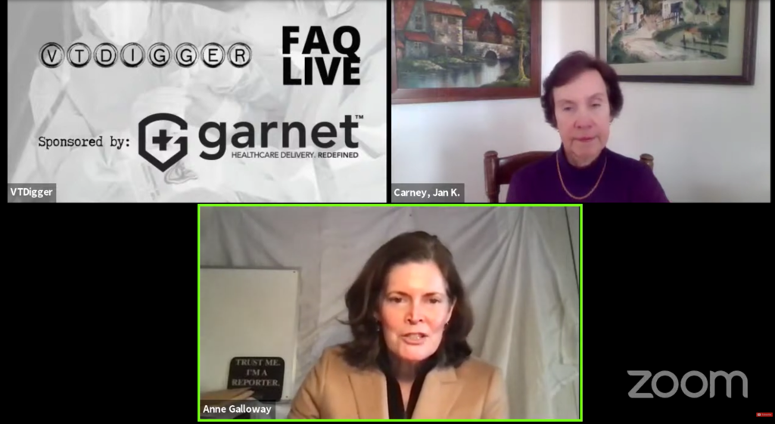

Published on July 20, 2021 and written by Emily Roseman
In August 2020, Jim Lehnhoff moved from New Jersey to Vermont to join the team at VTDigger as chief revenue officer. He’d been in sales for a few national commercial media sites, including Gawker and Slate, when he decided it was time to move to the world of public service journalism.

In 2020 VTDigger grew revenue from sponsorship and underwriting by more than 10%, a particularly important triumph in the face of the pandemic and financial uncertainty (including economic challenges for VTDigger itself).
Among other initiatives, Lehnhoff and team streamlined their ad availability and packaging process and landed a single large sponsor to cover costs (and more) for a virtual event series over the fall and winter.
VTDigger was one of seven outlets that participated in the GNI-INN Sponsorships Lab, a program focused on accelerating revenue for nonprofit news outlets from advertising, sponsorship, and underwriting. Blue Engine Collaborative, a new consortium of independent consultants and advisers with deep experience in driving audience and revenue at for-profits and nonprofits, led the programming that lasted six months and included a blend of virtual programming, team coaching, a community of shared practice, and a capacity-building grant. See the Nonprofit News Guide to Earned Revenue for best practices from the program. Across revenue from direct sold advertising, sponsorships and underwriting, and events, the seven publishers in the Lab reported more than 81% YOY growth.
After joining Digger, Lehnhoff realized the news outlet was underselling itself and relying on processes that required too many resources for a small team.
Back in August 2020, Digger offered ad spots randomly throughout its newsletters and placements on the homepage for a hodgepodge of days at a time. In some instances, Digger sold five placements per newsletter to five different clients. This a complex process to manage and execute internally, and meant that each sponsor was in effect competing for attention with several other sponsors within a single email. From a pricing perspective, Digger sold newsletter ads for $100 each, quite low for a newsletter with a 46,000 list size, 43% average open rate, and high trust in the community.
Leveraging insights from the GNI-INN Sponsorships Lab on packaging and pricing, Lehnhoff and team decided to reduce five ad spots to three and required clients to purchase a newsletter takeover (all three ad positions). They raised the individual ad rate to $250.
Lehnhoff applied a similar framework to display ads on the site. The previous approach was to offer clients (typically local businesses throughout Vermont) a single ad unit. Now clients are sold site full-day takeovers (four units) in 24-hour increments. After making this change, Lehnhoff and team communicated the shift to clients and partners, emphasizing the value and impact to audiences of seeing a single sponsor each day rather than a smattering of many.
For Lehnhoff, coming from the world of commercial media to a local, mission-driven organization meant having to learn the tricks of the trade in local markets.
One idea Lehnhoff took from the program, thanks to Steve Shalit, a Blue Engine Collaborative coach and the business development director at NJ Spotlight News: the power of virtual events. Shalit shared how virtual events are a relatively low-cost and high-impact offering for clients, especially for a news site with local and engaged audiences like VTDigger. One of Shalit’s favorite parts about selling virtual events: They’re perishable. Having an event date to pitch creates a sense of urgency.
Use this resource: For virtual event best practices, see page 24 of the Nonprofit News Guide to Earned Revenue.
The Digger team immediately went to work on the idea, ultimately making a short series of five, live streamed events called FAQ Live.
Each FAQ Live session involves a member of the Digger team (sometimes a reporter, sometimes founder and executive director Anne Galloway) interviewing a local expert on a topic of concern to Vermonters. The team also brainstormed what they could offer sponsors, including exclusive sponsorship of a coronavirus FAQ page, sponsor mention and logo throughout the livestream, and sponsorship of emails leading up to the events.
Lehnhoff put together a simple one-pager about the event series and what sponsorship would entail. Then, he pulled 400 contacts out of Digger’s customer relationship management (CRM) database — a mix of people and organizations that the outlet had worked with previously or that the team had contacted about previous sponsorship opportunities — and hit send.
| “Next week VTDigger is going to be launching a new virtual event series called FAQ Live…Here’s where you come in. We rely on the financial support of our underwriters and advertisers to continue our work, and this event series is no exception. We’re looking for sponsors to underwrite this project. Attached to this email, you’ll find information on what this sponsorship entails and the kind of exposure sponsors can expect to receive. Become a sponsor today, and let our readers know that you care about helping them to successfully navigate a complicated holiday season. Please let me know if you would like to schedule a time to discuss in more detail. Thank you for your support.” |
Of those 400 emailed contacts, 20 responded. Garnet Healthcare, a company that offered COVID testing to Vermonters, was the first to say yes.
The Digger team made sure Garnet Healthcare’s name and logo were visible throughout the five Zoom sessions. In addition to the interviewee’s screen and the local expert’s, they set up the Zoom room to include a third screen — a title card with the sponsor’s name and logo. Throughout the event, the Digger team clicked over to this sponsor title card to make it front and center for the event’s audiences. They also mentioned the sponsor’s name in the YouTube description and within a few newsletter editions leading up to the event.

The resulting five-video series included discussions on what to know about COVID-19 and the holidays, how and when will Vermonters receive a vaccine, and food insecurity in Vermont during COVID. Before each event, Digger solicited questions from the audiences to ask the expert. Each event had 200 to 600 attendees and between Zooms and site units, Garnet Healthcare’s spots had about 170,000 views and nearly 600 click-thrus.
Tip: Don’t stop at events — practice consultative or solutions selling. Digger builds campaigns that are as specific to clients’ objectives as possible. Every conversation with a client should start with asking, “what are your objectives?” Based on those goals, Lehnhoff will recommend a mix of offerings, including display advertising, podcast advertising, or a sponsorship spot in an upcoming virtual event. Starting with your client’s goals is a key part of the consultative or solutions selling approach, a strategy outlined in the Nonprofit News Guide to Earned Revenue (see page 37).
Lehnhoff plans to continue hosting and offering virtual events as prime spots for sponsors, but will begin integrating real-world events in addition to virtual, likely opening doors for more sponsorship opportunities.
Back to top“It’s really nice to be working for a mission-driven organization as opposed to one that’s just laser focused on revenue,” Lehnhoff said. “It makes a big difference, showing up to work every day and knowing that the work you’re doing is having a real and meaningful impact on the community. That’s been a huge breath of fresh air.”